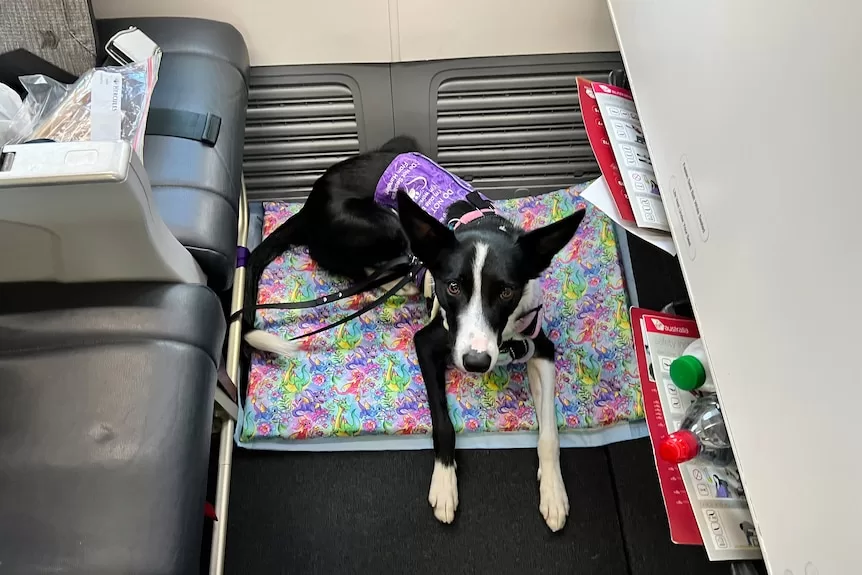Rachael Fullerton can’t imagine travelling without her assistance dog, Strike.
Key points:
- A Sydney woman is taking Qantas to court for not allowing her assistance dog on a flight
- Qantas says it consults with anyone wanting to travel with an assistance dog to ensure it is safe to carry on board
- It is part of a broader struggle the disability community often faces accessing transport services
Ms Fullerton, who lives with multiple disabilities, said her faithful border collie has helped her reach unprecedented levels of independence since he came into her life a few years ago.
“He’s allowed me the confidence to be able to go places by myself,” the Sydneysider said.
“He alerts me to medical issues before they … become an issue. He also does a lot of other things, like helping with anxiety …”
Strike has also been trained to nudge Ms Fullerton with his nose if he senses her heart rate is rising or her sugar levels are dropping, and can find her accessible pathways in crowded spaces.
The pair travel everywhere together, usually without any issues.
That was until recently, when Qantas refused to give permission for Strike to fly with her.
Ms Fullerton was shocked.
Other airlines, including Rex Airlines and Virgin Australia, have approved Strike to travel on board and he is allowed on public transport in New South Wales.
“I felt like I was unfairly treated [by Qantas],” Ms Fullerton said.
After a failed conciliation attempt through the Australian Human Rights Commission, Ms Fullerton is now taking Qantas to the Federal Court, alleging disability discrimination and seeking a change to the airline’s policies.
The case has been taken up by the Public Interest Advocacy Centre (PIAC) and will be heard early next year.
PIAC senior solicitor Sheetal Balakrishnan said Ms Fullerton could not fly without Strike, as he is trained and essential to alleviating the impact of her disabilities, and for Qantas not to allow this was discrimination.
“People with disabilities shouldn’t have to fight … to get fair treatment,” she said.
Ordeal quickly became ‘a disaster’
Under Qantas rules, assistance dogs must be trained to a level that meets standards set by Assistance Dogs International (ADI) or the Queensland Guide, Hearing and Assistance Dogs Act (GHAD).
Qantas considers dogs trained by organisations or trainers that are not ADI or GHAD approved, but can demonstrably meet the ADI or the GHAD criteria.
While Strike has been recognised as an assistance animal by various bodies, including the National Disability Insurance Scheme (NDIS) and NSW government, he has not been accredited by ADI or under the GHAD.
Ms Fullerton said she looked into having Strike accredited by a GHAD-approved organisation, but they did not have any in NSW willing to certify a dog it did not raise, train or place itself.
After first making contact with Qantas in September 2022, and providing evidence of Strike’s training, Ms Fullerton said she was told she would need to fill out a form.
“The form was impossible to fill out if you didn’t have a dog that was certified by ADI or GHAD,” she said.
Over the next few months, things “went round in circles”, Ms Fullerton said.
“They just kept giving me generic responses that didn’t answer the question,” she said.
“It just became a disaster.”
ABC News: Billy Cooper
)
Ms Balakrishnan said Qantas’s requirements for assistance animals were narrower than what is required under the Disability Discrimination Act, which PIAC argues Strike meets.
“Qantas is making its own rules, which we say is arbitrary and unfair and inconsistent with what is required and allowed under the national laws,” Ms Balakrishnan said.
In a statement, Qantas said it recognised the role assistance dogs played for their owners and that it carried “many” on board each year.
“Qantas consults with customers with disability who want to travel with an assistance dog in advance to obtain all relevant information to ensure it is safe to carry the dog in the aircraft cabin,” a spokesperson said.
Not an isolated case
People with disability, particularly wheelchair users, often feel neglected by transport infrastructure and services.
Wheelchairs are also routinely broken or damaged during air travel, and instances of airlines turning away people with assistance animals are relatively common.
Some people have reported being allowed to fly with their assistance dog on one occasion, only to be turned down by the same airline on another.
“It’s important … for people who rely on assistance dogs that are recognised under the national law to be able to fly on Qantas like everyone else,” Ms Balakrishnan said.
Ms Fullerton hopes her experience will help make air travel easier for others with assistance animals.
“I want to make changes so that it’s accessible for everybody,” she said.
Loading…
